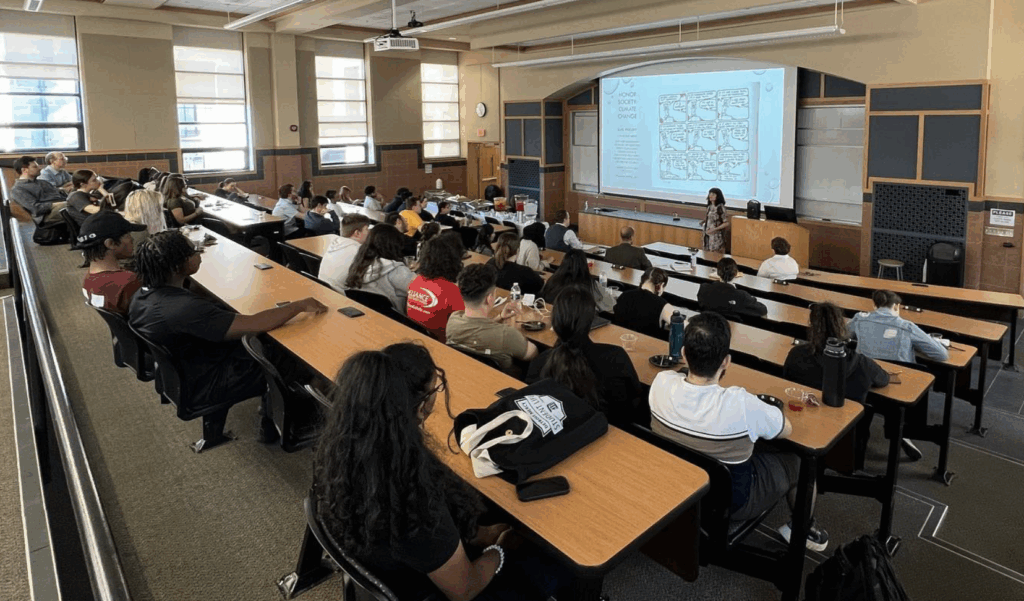
The University of Detroit Mercy’s Honors Program welcomed its largest freshman class this fall, a milestone that reflects both the growth of the program and its mission to shape students who think critically, reflect deeply and connect their education to their lives.
At first glance, the Honors Program can seem like a gold star — a shiny distinction to flash on a resume or to impress your parents on commencement day. According to Dr. Stephen Pasqualina, who directs the program, that impression misses the point.
“What matters is how you’re willing to interrogate the reasons behind what you’re doing, what you’re studying and what you want your life to be after college,” Pasqualina said.
That reflective approach is built directly into the program’s curriculum, where small, discussion-based classes ask students to slow down and wrestle with ideas rather than chase the right answer. For Pasqualina, the value lies in how these courses push students beyond what feels comfortable.
As he put it, “A mentor once told me the humanities are the really hard sciences. There are no answers in the humanities, but that means you have to keep working as if you’re going to find one.”
For students used to multiple-choice tests and formula sheets, the idea of having no single right answer can sound like a nightmare. In the Honors Program, though, that uncertainty becomes the point. It asks students to slow down, sit with ideas and discover meaning in conversation rather than memorization.
That change in pace is something students notice almost immediately in the Honors First-Year Seminar.
Even with the largest incoming class in its history, Pasqualina emphasized that the program’s real strength is not its size but its sense of community.
“We put a lot of emphasis on students learning in cohorts,” he said. “They take classes together, they learn from one another, and often they end up forming friendships that last a lifetime. Some even meet their spouses here.”
That emphasis on connection is something students feel deeply once they join. For co-president Alexandria Jarbo, leadership is less about titles and more about fostering this community where students feel supported. She described the executive board as a bridge between faculty and students, working to keep the program welcoming and inclusive.
Communications and Publicity Co-Chair Eemi Toma echoed that sentiment, adding that the real strength of the program comes when students choose to get involved.
“The more you engage with the community, the more meaningful your time here will become,” she said.
Together, their perspectives show how the Honors Program balances strong academics with a culture of service and personal growth that help turn peers into a genuine support system.
From the very first weeks on campus, new honors students have described how quickly that sense of belonging takes hold. Raneem Faraj, a freshman chemistry major and literature minor, said she felt part of something bigger almost immediately.
“It feels amazing to be part of something so big, and it makes me proud,” she said. “The faculty and students are extremely welcoming, and the induction ceremony made me feel like I truly belong.”
That sense of belonging also has a physical home in Gardella House, the program’s dedicated study space, now being renovated to better serve the next generation of honors students. At the same time, the program itself has evolved. In 2024, the curriculum was revised to reduce the number of required credits and introduce a portfolio option in place of the traditional thesis—a change Pasqualina said was meant to keep honors academically strong while making it more flexible for students in demanding majors.
Looking at this year’s record-setting freshman class, Pasqualina’s advice was simple, as he said, “You have these like three or four years designated for studying and don’t let them just fly by. And I mean that like socially, have fun, like make friends, go to stuff. But also intellectually, take your classes seriously. Every assignment, every reading is an opportunity to learn. And I understand people get busy and things get stressful and sometimes you have to sort of prioritize one thing over another. But try to just get everything you can out of your four years in college. And try to develop a mind and a relationship to knowledge and to learning that will serve you for your whole life.”
For the newest honors class, the story is theirs to write.
